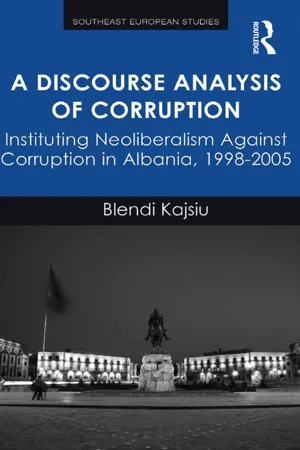
A Discourse Analysis of Corruption
Instituting Neoliberalism Against Corruption in Albania, 1998-2005
- 224 pages
- English
- ePUB (mobile friendly)
- Available on iOS & Android
A Discourse Analysis of Corruption
Instituting Neoliberalism Against Corruption in Albania, 1998-2005
About This Book
Why did Albania enjoy some of the most successful anti-corruption programs and institutions along with what appeared to be growing levels of corruption during the period 1998-2005? Looking at corruption through a post-structuralist discourse analysis perspective this book argues that the dominant corruption discourse in Albania served primarily to institute the neoliberal order rather than eliminate corruption. It did so in four interrelated ways. First, blaming every Albanian failure on corruption avoided a critical engagement with the existing neoliberal developmental model. Second, the dominant articulation of corruption as abuse of public office for private gain consigned it to the public sector, transforming neoliberal policies of privatisation and expanding markets into anticorruption measures. Third, international anticorruption campaigns reproduced an asymmetric relationship of dependency between Albania and the international institutions that monitored it by articulating corruption as internal to the Albanian condition. Finally, against corruption international and local actors could articulate a neoliberal order that was free of internal contradictions and fully compatible with democratization. As a rare example of post-structuralist discourse analysis of corruption this book can be useful for future research on discourses of corruption in other countries of the region and beyond.
Frequently asked questions
Information
Table of contents
- Cover Page
- Title Page
- Copyright Page
- Dedication
- Contents
- List of Abbreviations
- List of Tables
- List of Figures and Graphs
- Acknowledgements
- Introduction: The Corruption Paradox in Albania
- 1 Limitations of Corruption Analysis
- 2 A Discourse Analysis of Corruption: A Theoretical Framework
- 3 The Emergence of Corruption in Albania: The Floating Signifier
- 4 International Intervention: Fixing the Meaning of Corruption, 1998–2005
- 5 The International Politics of Anti-Corruption: Instituting Neoliberal Order
- 6 Corruption Discourse in the Albanian Political Scene, 1998–2005
- 7 Sustaining Neoliberalism against Corruption
- Conclusion: Instituting Neoliberal Order through the Discourse of Corruption
- List of References
- Index